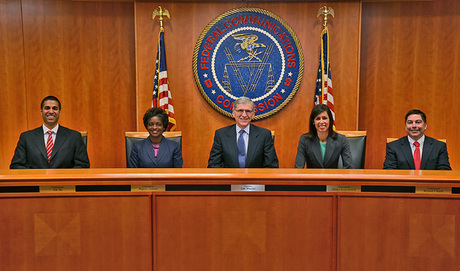FCC quashes TETRA on public safety bands

The Federal Communications Commission (FCC) has effectively prohibited the use of TETRA systems in the US on National Public Safety Planning Advisory Committee (NPSPAC) frequencies in the 800 and 700 MHz bands, according to a ruling issued on 25 April.
TETRA is widely used around the world, but has only recently begun to gain a foothold in the USA, using non-public safety spectrum.
“In this Report and Order, we adopt rules that guard against interference to critical public safety communications in the 800 MHz National Public Safety Planning Advisory Committee (NPSPAC) Federal Communications Commission FCC 16-48 2 band1 (806-809/851-854 MHz) by confirming the emission mask applicable to digital transmissions in the NPSPAC band,” the order states.
“In so doing, we lessen the possibility that first responders will encounter harmful interference in the NPSPAC band and provide certainty to manufacturers concerning the capabilities required of radios used for interoperable communications.”
“The commission also declined to permit TETRA on the narrowband portion of the 700 MHz public safety band, noting that TETRA does not conform to the interoperability standard for the 700 MHz narrowband public safety band interoperability channels,” the order added.
As well as the TETRA ruling, the FCC order stipulates that public safety radios must “have analog FM capability when operating on 800 MHz, VHF and UHF public safety mutual aid and interoperability channels”.
FCC Commissioner Michael O’Rielly issued a statement in which he said that he agrees with the majority of the ruling but does not support the analog-FM section.
“I largely oppose any type of technology mandate,” O’Rielly said in his statement. “Today’s item requires that all public safety radios operating on the 800 MHz, VHF and UHF mutual aid and interoperability bands must have analog FM capability. While I understand the pursuit of interoperability on interoperability channels, industry — despite not having a technology requirement — has adopted FM analog as the de facto standard in these bands.
“Therefore, this requirement seems unnecessary. In fact, what happened here is the preferable approach — industry determined the best means to produce interoperability. Once a technology is set in regulatory stone, innovation and investment may be deterred or, if a better technology is or becomes available, it could take years to update our rules to reflect such advancements. And, frankly, it seems ridiculous in today’s digital world to be requiring that devices have less-efficient, analog technology.”
The TETRA ruling follows on from earlier orders, which the FCC said left some ambiguity over which radio technologies could be used on public safety spectrum. It was Harris Corporation that had filed the petition with the FCC seeking a ruling on the issue, which led to the latest order.
“The FCC’s decision on this matter delivers an important victory for public safety, and Harris applauds the commission for taking swift action that will both protect public safety communications from interference and promote interoperability,” said Dennis Martinez, CTO for Harris Public Safety and Professional Communications, in a statement.
“Upon observing the imminent risks posed by low-power TETRA technology in the NPSPAC band that would have subjected public safety communications to interference, Harris Corporation brought its challenge to the commission.
“Harris engineers argued a strong case based on highly technical and practical merits and are pleased that the commission has sided with public safety.”
You can read more about the FCC’s ruling here, including toing and froing with potentially affected vendors such as PowerTrunk, which has TETRA contracts with New Jersey Transit and New York’s Metropolitan Transportation Authority.
2025–26 Thought Leaders: Tim Karamitos
Tim Karamitos from Ericsson discusses the connectivity requirements of emergency services and...
2025–26 Thought Leaders: Ruth Tovo
Comms Connect panellist Ruth Tovo, from the South Australian SES, discusses the technical...
ARCIA update: celebrating excellence in our industry
The ARCIA Annual Gala Dinner and Excellence Awards took place during the same week as Comms...



